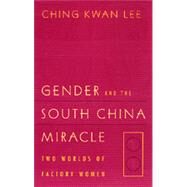Gender and the South China Miracle
, by Lee, Ching Kwan- ISBN: 9780520211254 | 0520211251
- Cover: Hardcover
- Copyright: 8/1/1998
Both Yuk-ling, a busy Hong Kong mother of two, and Chi-ying, a young single woman from a remote village in northern China, work in electronics factories owned by the same foreign corporation, manufacturing identical electronic components. After a decade of job growth and increasing foreign investment in Hong Kong and South China, both women are also participating in the spectacular economic transformation that has come to be called the South China miracle. Yet, as Ching Kwan Lee demonstrates in her unique and fascinating study of women workers on either side of the Chinese-Hong Kong border, the working lives and factory cultures of these women are vastly different. In this rich comparative ethnography, Lee describes how two radically different factory cultures have emerged from a period of profound economic change. In Hong Kong, "matron workers" remain in factories for decades. In Guangdong, a seemingly endless number of young "maiden workers" travel to the south from northern provinces, following the promise of higher wages. Whereas the women in Hong Kong participate in a management system characterized by "familial hegemony," the young women in Guangdong find an internal system of power based on regional politics and kin connections, or "localistic despotism." Having worked side-by-side with these women on the floors of both factories, Lee concludes that it is primarily the differences in the gender politics of the two labor markets that determine the culture of each factory. Posing an ambitious challenge to sociological theories that reduce labor politics to pure economics or state power structures, Lee argues that gender plays a crucial role in the cultures and management strategies of factories that rely heavily on women workers.







